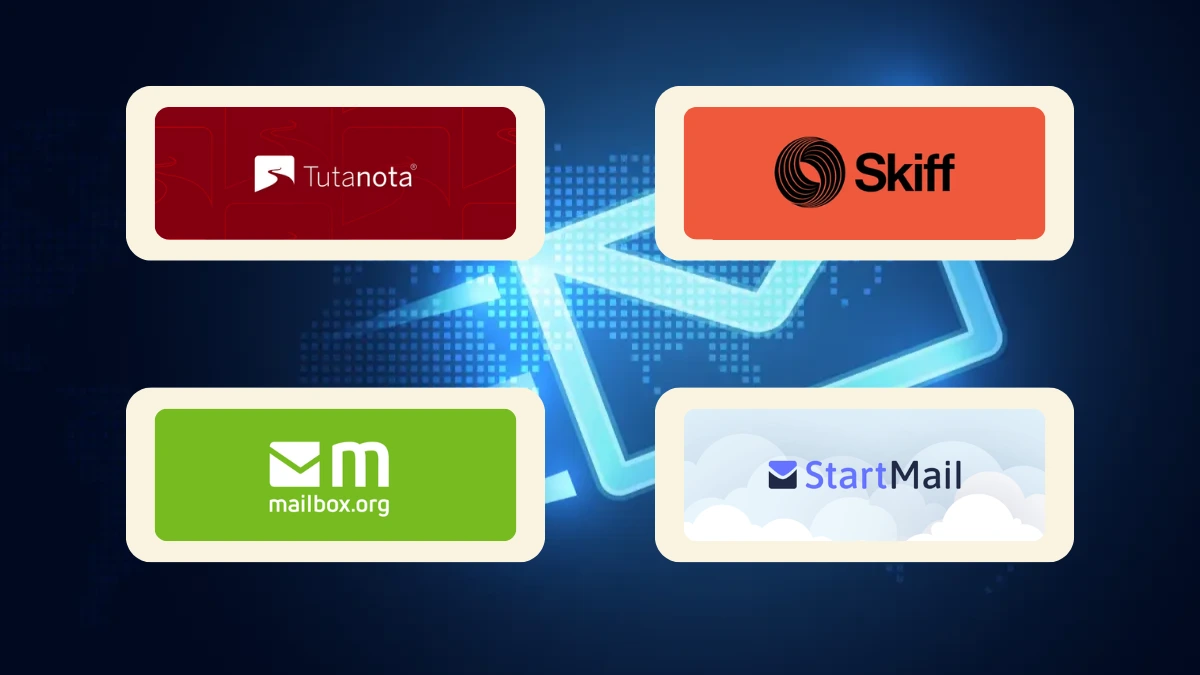
Privacy has become a major worry for both individuals and corporations in today’s digital environment. Secure email services like ProtonMail have becoming more and more popular as worries about data leaks and surveillance increase. People that appreciate security choose Proton Mail (formerly ProtonMail), which is well-known for its zero-access design and end-to-end encryption.
ProtonMail isn’t the only choice, though. There are a number of great substitutes that are on par with or even better than ProtonMail, regardless of your preferences for greater flexibility, business-friendly features, or an alternative kind of email encryption.
These are the top four ProtonMail substitutes for people and companies in 2025.
House Passes Historic Crypto Bill, Paving Way for Federal Stablecoin Rules
1. Tutanota – The All-in-One Encrypted Mailbox

Best for: Privacy-focused individuals and small teams
Overview:
Tutanota (Latin for “secure message”) is an encrypted email provider with headquarters in Germany that prioritises privacy. A proprietary encryption mechanism is used by Tutanota to secure your entire mailbox, including contacts and subject lines, in contrast to ProtonMail.
Key Features:
- End-to-end encryption for emails, contacts, and calendars
- Open-source with strong community support
- Based in Germany and GDPR-compliant
- Free tier available; premium plans offer custom domains and more storage
- Built-in encrypted calendar
Why it’s a strong alternative:
Tutanota is the best option for users who desire a smooth, simple interface without sacrificing security. The user interface is easy to use, and all data, including email content and login passwords, is secure. For people who want safe communication but don’t require sophisticated business tools, it’s ideal.
Potential drawbacks:
- No IMAP/SMTP support (can’t use standard email clients)
- Fewer integrations with third-party tools
India and China Respond Differently as U.S. Tariff Reshape Global Trade
2. Mailbox.org – Secure Email with Full Business Tools

Best for: Businesses and professionals looking for a secure, feature-rich ecosystem
Overview:
Another German company that offers a variety of productivity tools along with encrypted email is Mailbox.org. Email, calendaring, cloud storage, video conferencing, and document editing are all included, and it is ad-free and encrypted.
Key Features:
- PGP encryption with easy web-based setup
- Team and admin controls for businesses
- Includes office suite (documents, spreadsheets, presentations)
- Encrypted cloud storage and video conferencing
- Strong GDPR protections
Why it’s a strong alternative:
Mailbox.org is an attractive alternative to ProtonMail for companies wishing to replace both email and productivity applications in one bundle. It is an enterprise-friendly solution that is powerful due to its ability to manage teams, use your own domain, and work totally in the cloud.
Potential drawbacks:
- More complex interface than simpler services
- Setup can be slightly technical for beginners
Trump Quietly Expands Trade War Strategy Across Asia to Undermine China
3. Start Mail – Private Email That Works With Your Favorite Client

Best for: Individuals who want email privacy with the flexibility of using standard clients
Overview:
The developers of Startpage, a privacy-focused search engine, are also behind StartMail. Users may integrate it with well-known email programs like Outlook or Thunderbird thanks to its user-friendly encrypted email services and complete compatibility with IMAP/SMTP protocols.
Key Features:
- PGP email encryption
- Unlimited disposable email aliases
- Compatible with desktop and mobile clients
- Based in the Netherlands (GDPR-compliant)
- No ads or tracking
Why it’s a strong alternative:
StartMail is a fantastic substitute for ProtonMail for individuals who prefer email privacy without sacrificing the ease of use of conventional email programs. It makes using encryption simple and doesn’t require you to switch to a new webmail or app.
Potential drawbacks:
- No free version (only a trial)
- Lacks collaboration features (no calendar or document tools)
Trump Threatens to Cut Elon Musk’s Subsidies Amid Feud Over ‘One Big Beautiful Bill
4. Skiff Mail – The Modern, Encrypted Workspace

Best for: Professionals, creators, and startups who want a modern Gmail alternative with privacy
Overview:
Skiff is a more recent privacy-focused platform that provides calendars, document collaboration, and encrypted email in a sleek, contemporary design. Skiff, which is open-source and supported by prestigious investors, was developed with the privacy-conscious generation in mind.
Key Features:
- End-to-end encrypted email, docs, and calendar
- Open-source encryption protocols
- Beautiful, intuitive interface with mobile apps
- Free and paid tiers available
- Custom domain support and team workspaces
Why it’s a strong alternative:
Skiff distinguishes itself by providing more than just private email; it also offers a privacy-focused office package. It’s ideal for people and companies who don’t want to rely on Big Tech platforms like Google or Microsoft and want a completely integrated experience across email, calendars, and documents.
Potential drawbacks:
- Still growing; fewer features compared to more mature platforms
- Limited integrations with legacy business tools
India Notifies WTO of Tariff Response to U.S. Auto Duties Affecting $2.8 Billion in Exports
Final Thoughts: Choosing the Right ProtonMail Alternative
If ProtonMail doesn’t fully satisfy your demands, whether it’s due to cost, integration issues, or a dearth of business features, you’re not stuck. The market for encrypted email has changed, and there are now some formidable competitors that provide comparable or superior features for certain use cases.
- Choose Tutanota if you want simple, ultra-private email with encrypted calendars.
- Choose Mailbox.org if you’re a business needing full-suite collaboration tools.
- Choose Start Mail if you prefer traditional email clients with added privacy.
- Choose Skiff if you want a sleek, all-in-one workspace with encryption.
In a world where data is currency, protecting your communications is more than a preference — it’s a necessity.
